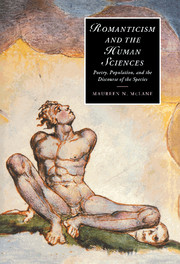Book contents
- Frontmatter
- Contents
- Acknowledgments
- Introduction, or the thing at hand
- Chapter 1 Toward an anthropologic: poetry, literature, and the discourse of the species
- Chapter 2 Do rustics think?: Wordsworth, Coleridge, and the problem of a “human diction”
- Chapter 3 Literate species: populations, “humanities,” and the specific failure of literature in Frankenstein
- Chapter 4 The “arithmetic of futurity”: poetry, population, and the structure of the future
- Chapter 5 Dead poets and other romantic populations: immortality and its discontents
- Epilogue: Immortality interminable: the use of poetry for life
- Notes
- Bibliography
- Index
- CAMBRIDGE STUDIES IN ROMANTICISM
Chapter 2 - Do rustics think?: Wordsworth, Coleridge, and the problem of a “human diction”
Published online by Cambridge University Press: 22 September 2009
- Frontmatter
- Contents
- Acknowledgments
- Introduction, or the thing at hand
- Chapter 1 Toward an anthropologic: poetry, literature, and the discourse of the species
- Chapter 2 Do rustics think?: Wordsworth, Coleridge, and the problem of a “human diction”
- Chapter 3 Literate species: populations, “humanities,” and the specific failure of literature in Frankenstein
- Chapter 4 The “arithmetic of futurity”: poetry, population, and the structure of the future
- Chapter 5 Dead poets and other romantic populations: immortality and its discontents
- Epilogue: Immortality interminable: the use of poetry for life
- Notes
- Bibliography
- Index
- CAMBRIDGE STUDIES IN ROMANTICISM
Summary
But alas, amongst Children, Ideots, Savages, and the grosly Illiterate, what general Maxims are to be found? What universal Principals of Knowledge?
– John Locke, Essay Concerning Human Understanding (1.2:64)In 1800, William Wordsworth defended the “experiment[s]” of his Lyrical Ballads as a new “species of poetry … which is genuine poetry.” Fifteen years later, Samuel Taylor Coleridge was still assessing the impact of this supposedly new species. Taking Wordsworth's poetry, and his defense of it, as exemplary literary cases in the Biographia Literaria, Coleridge mounted an extended critique of the claims – linguistic, anthropological, and moral – of Wordsworth's poetic species. Chapter xvii features his most sustained analysis, which he introduces as follows:
Examination of the tenets peculiar to Mr Wordsworth – Rustic life (above all, low and rustic life) especially unfavorable to the formation of a human diction – The best parts of language the products of philosophers, not of clowns or shepherds – Poetry essentially ideal and generic – The language of Milton as much the language of real life, yea, incomparably more so than that of the cottager. (emphasis added)
Coleridge's objections to Wordsworth's theory begin with his rejection of “rustic life” as a suitable ground for a “human diction.” Coleridge thus marks a gap between the “rustic” and the “human,” whereas Wordsworth in 1800 had offered the rustic as a human prototype. Coleridge took very seriously Wordsworth's ambition to write from the real language of men.”
- Type
- Chapter
- Information
- Romanticism and the Human SciencesPoetry, Population, and the Discourse of the Species, pp. 43 - 83Publisher: Cambridge University PressPrint publication year: 2000

